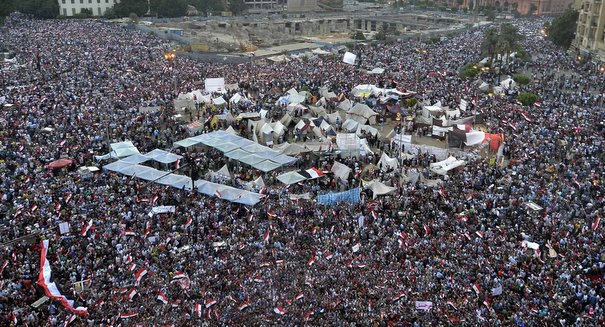In the days leading up to June 30, with high tension and polarization, Egypt braced for what were some of the largest and most widespread demonstrations since the toppling of Hosni Mubarak in 2011. While it is difficult to predict where the country is heading, the protest succeeded in generating a reaction from the military. On July 1, the military issued a statement calling on all parties to reach an agreement within 48 hours or else the Supreme Command of the Armed Forces would put forth its own “roadmap” for the future of Egypt. In response, President Mohamed Morsi rebuffed the army's deadline, saying he was not consulted and was "going ahead" with his own plan. In addition, at least five ministers have resigned from their posts, including Foreign Minister Mohamed Kamel Amr. The situation remains fluid, and it is unclear what exactly will unfold in the coming days. Regardless of the outcome of the political process or military action, it is highly unlikely that this will be the final twist in Egypt's so-called “democratic transition.”
The calls for Morsi to step down came in full force on the anniversary of his election. Over the past year, Morsi has managed to anger people across diverse social strata—from pro-military conservatives and pro-revolutionary figures to liberal political hopefuls and labor rights activists. It is therefore difficult to navigate the complexity of the protesters’ motivations. What has become clear is that Morsi can no longer rely on his agreements and compromises with the police and military to quiet popular anger. In counter-protests, hundreds of thousands of Morsi supporters have gathered around the country, mostly in the eastern Cairo district of Nasr City to protect “the democratic legitimacy” of the president, warning that if Morsi were to be ousted then any hopes of a democratic future for Egypt would be jeopardized.
Perhaps the most noticeable aspect of the June 30 demonstrations—and the main reason the protests have been so large—is that much of the discontent relates to everyday socioeconomic grievances. The economy is in an alarmingly poor state, with foreign reserves dropping and inflation and poverty rising. This has been coupled, in the last week, with an acute fuel shortage that has left many roads paralyzed and has exacerbated anger towards the state.
Prior to this, mobilization against Morsi had mostly centered on political grievances. In November, Morsi's constitutional decree, which expanded his executive powers, enraged both revolutionaries and those considered remnants of Mubarak’s regime (known as fulul). The latter in particular had quite a strong media presence leading up to June 30. Those aligned with the formal political opposition, in particular the National Salvation Front (NSF), have tended to base their opposition to the Muslim Brotherhood around issues of identity and nationalism—a frequent accusation is that the Brotherhood are not Egyptian and are in fact “occupying” the country in an attempt to impose the “Ikhwhanization” of the state. In reality, the Brotherhood and the NSF's ideas correlate very closely in terms of socioeconomic policies and attitudes towards the armed forces.
The military has been at the center of this recent political wrangling. Despite Minister of Defense Abdel Fattah El-Sisi’s message calling for a resolution in 48 hours, the military has so far appeared to be on the side of the state. Morsi's administration has attempted to form an uneasy alliance with both the security sector and the business sector through reconciliation. Playing these various sides off of each other has been an attempt to protect a state system that the Brotherhood inherited and was unwilling or unable to reform. One of the main points that Morsi tried to highlight in his June 26 speech was to stress that he was in charge of the military and that a functioning and democratic division of power was in place.
What is problematic, of course, is that these alliances have always been weak. Morsi has little control over the police, some of whom even went on strike towards the end of April, apparently unwilling to continue cracking down on citizens for a president whom they do not truly accept. With regards to the military, El-Sisi's presence at Morsi's speech is a sign that—for now at least—the army remains part of the ruling elite. The statement released on July 1, calling for “people's demands” to be met, is another clear sign that the military is above the presidency in the state hierarchy. They have appointed themselves as the guardians of the state, warning political factions to negotiate or be forced to follow the military’s “roadmap” for the country’s future—though the contents of this roadmap remain unclear.
Whatever the outcome, be it a full intervention or a military-mediated settlement, it will be unlikely to bring any semblance of stability to the country. Egypt remains in a revolutionary movement, and the strongest lesson to be learned from the June 30 protests is that the people are still stronger than the state.
Mohamed El-Shewy is a researcher at the Cairo-based Egyptian Initiative for Personal Rights (EIPR) focusing on transitional justice and accountability.


-1.png)



.png)